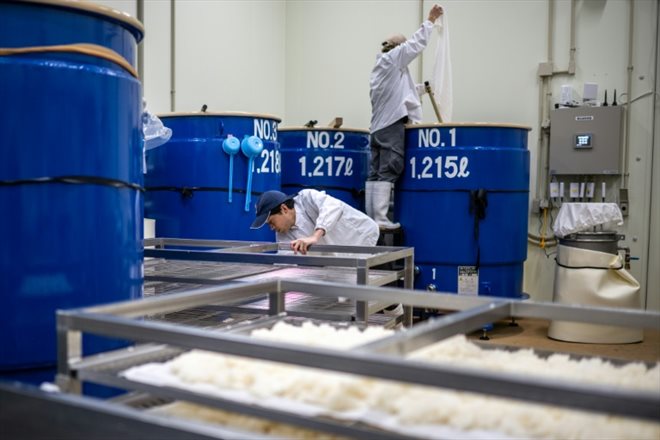A bottle of sake from the Iwaki Kotobuki brewery taken on August 31, 2023 in a restaurant in Namie, in the Fukushima department (northeast of Japan) (AFP/Philip FONG)
Daisuke Suzuki helps warm the bruised hearts of Fukushima fishermen with what he does best: produce sake whose taste perfectly matches that of local fish and seafood.
Like local fishermen, the life and career of this 50-year-old brewer were turned upside down by the tsunami of March 11, 2011, which forced him to urgently evacuate with his family, leaving everything behind.
The tidal wave had destroyed everything in Ukedo (north-eastern Japan), a small fishing port in the town of Namie, including the Iwaki Kotobuki sake brewery that Mr. Suzuki’s family had operated for two centuries.
However, this rice wine was the pride of local fishermen, who were accustomed to receiving bottles of it as a reward when they returned with their nets full of fish.
“Sake has always been there, like fish,” according to a taciturn fisherman from Ukedo interviewed by AFP but who did not wish to give his name. “It’s always been like this here since I was little.”
– The quest for the taste of yesteryear –
The 2011 tsunami also caused the Fukushima nuclear disaster. Because of radiation risks, Daisuke Suzuki was unable to return for a year to Ukedo, which is less than ten kilometers north of the devastated power plant.

Daisuke Suzuki on September 1, 2023 in front of the site of his former sake brewery destroyed by the deadly tsunami of March 11, 2011 in Ukedo, in the Fukushima department (northeast of Japan) (AFP/Philip FONG)
“I had nothing left and I couldn’t imagine how I was going to start producing my own sake again,” Mr. Suzuki recalls as he walks near the site of his defunct brewery in Ukedo, where a giant dike now stands against the tsunami.
But he took heart when a research lab reminded him that it kept samples of Iwaki Kotobuki’s fermentation starter (“shubo”), the essential matrix for resurrecting this sake.
Six months after the tsunami, Mr. Suzuki re-established a brewery in the neighboring department of Yamagata.
However, it was difficult for him to immediately recreate the original taste of Iwaki Kotobuki: because sake depends on a subtle balance between the quality of the water, the rice and the environment, and that of the brewery. ‘Ukedo had been developed by his ancestors over several generations.
It was by letting his sake age for several months that it finally regained its original taste. At that moment, “I really had the impression that I was saved,” says the brewer.
– “The pride of the city” –
With his brother, Mr. Suzuki now manages two breweries: that of Yamagata and a new one that he established very close to Ukedo in 2021.
That year, Fukushima fishermen were allowed to re-sell their products, albeit on a small scale, and they are still struggling to regain the trust of consumers, both in Japan and abroad.

Employees sorting rice at the Iwaki Kotobuki sake brewery in Namie (northeast Japan) on September 1, 2023 (AFP/Philip FONG)
And the launch at the end of August of the release into the Pacific Ocean of the water accumulated on the site of the devastated nuclear power plant dealt an additional blow to local fishermen, even if the Japanese authorities and the International Atomic Energy Agency ( IAEA) ensure that this process is safe for the environment and human health.
As soon as this operation was launched, China decided to suspend all its imports of Japanese seafood products, a new blow for Fukushima fishermen.
But Daisuke Suzuki is determined to weather this new storm with local fishermen, like the previous ones.
“Without Ukedo fish, our sake would be missing something,” he explains to AFP. The local white-fleshed fish “is like the lover of our sake” because their respective tastes match perfectly, he adds.
The energetic brewer launched a new range of Iwaki Kotobuki this year, specially designed with the help of an artificial intelligence system to pair with eight different Fukushima seafood products, such as clams, fish dishes or crab.
“The revival of the sake brewery is the pride of the city,” Yasushi Niitsuma, 64, owner of a bar-restaurant near the port, told AFP.
“Sake is the city’s tradition and Mr. Suzuki helps to perpetuate it,” he adds. “And it encourages fishermen to continue fishing.”
© 2023 AFP
Did you like this article ? Share it with your friends using the buttons below.




